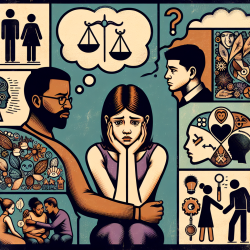Introduction
In the realm of adolescent mental health, innovative approaches are crucial for addressing the complex challenges faced by young individuals. The research article titled, “If there is a tension about something, I can solve it”: A qualitative investigation of change processes in a trial of brief problem-solving interventions for common adolescent mental health problems in India, offers valuable insights into the efficacy of problem-solving interventions. This study, conducted in New Delhi, India, highlights the potential of brief, low-intensity interventions in enhancing mental health outcomes for adolescents.
Understanding the Study
The study was embedded within a school-based randomized controlled trial, comparing two formats of problem-solving interventions: a lay counsellor-led approach supported by printed materials, and a bibliotherapy approach using printed materials alone. The research involved 32 participants aged 14 to 20 years, assessing their experiences and outcomes over a 12-month follow-up period.
Key Findings
Through thematic framework analysis, five key themes emerged:
- Impacts on Symptoms and Functioning: Participants reported symptomatic improvements and functional gains, indicating the effectiveness of the interventions.
- Processes Underlying Problem Solving: Changes in positive beliefs, attitudes, and emotions were observed, leading to a more effective problem-solving coping style.
- Experiences of Problem-Solving Materials: While participants found the materials beneficial, they noted diminishing use over time, highlighting the need for ongoing engagement.
- Role of Supporting Figures: The facilitating roles of counsellors and trusted individuals were crucial in sustaining the use of problem-solving skills.
- Recommended Modifications: Suggestions included more flexible and personalized intervention delivery, along with more engaging materials.
Implications for Practitioners
For practitioners, these findings underscore the importance of integrating problem-solving interventions into adolescent mental health care. The study highlights the benefits of a counsellor-led approach, which appears to better sustain and generalize problem-solving skills beyond initial issues. Practitioners are encouraged to consider the following strategies:
- Incorporate problem-solving techniques into therapy sessions to foster positive belief systems and coping mechanisms.
- Engage with adolescents using relatable and dynamic materials to maintain interest and participation.
- Emphasize the role of supportive figures, such as counsellors, in guiding adolescents through their mental health journeys.
- Adapt interventions to be more personalized and accessible, ensuring they meet the unique needs of each adolescent.
Encouraging Further Research
While this study provides a foundation, further research is needed to explore the long-term impacts and scalability of these interventions. Practitioners and researchers alike are encouraged to delve deeper into the nuances of problem-solving therapy and its applications across diverse cultural contexts.
Conclusion
By embracing data-driven insights and innovative approaches, practitioners can significantly enhance the mental health outcomes for adolescents. The findings from this study offer a promising pathway for integrating effective problem-solving interventions into mental health care, paving the way for healthier, more resilient young individuals.
To read the original research paper, please follow this link: “If there is a tension about something, I can solve it”: A qualitative investigation of change processes in a trial of brief problem-solving interventions for common adolescent mental health problems in India.










